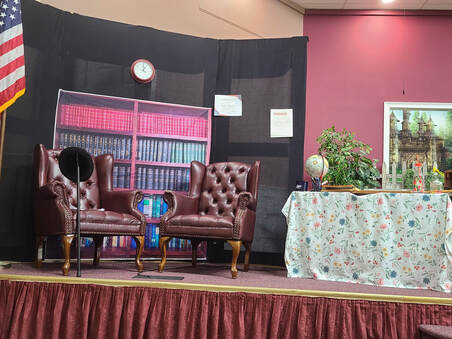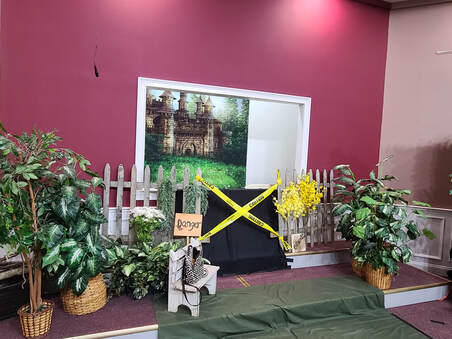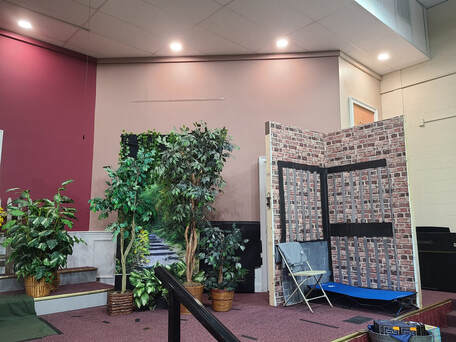|
The play was finished, and I breathed a sigh of relief. It was over. I could relax as the rest of the service continued. The little K5 graduates were very cute as they walked down in their red gowns. They had no idea what was going on but were excited about the award they would each get. Their smiles were contagious, infecting the entire crowd watching them.
As the names of the students were called out, my mind wandered to the drama that had just been performed. I was so proud of my students – they had done an amazing job that night, something that I’d had plenty of doubts about in the previous weeks of practice. In fact, I had almost considered canceling the entire production because it was just not getting anywhere. I had felt as if over half my class had not even attempted to put any effort into learning their lines or listen to my directions on how to act their part on stage. I acquired many new gray hairs during the last three months, thanks to the many moments of grief and frustration I experienced over my students’ behavior. I felt like we were just not connecting. It is a teacher’s job to tie heart strings with their students. To connect with their heart. Each one learns differently. Each one has something inside that makes them tick. Something that makes them come alive and blossom. They all have their strengths and weaknesses, and we need to work with both. Connecting is so important. And I felt like I was not connecting with them all through the year. There were the few easy ones who did everything that was expected, but then I had the ones who either had no choice to be in my class, or they had chosen the drama elective because they preferred that option over the other elective choice. They thought it would be fun. And it was, at first. We played games to help them be comfortable with each other, games that encouraged teamwork and cooperation and working together. We did improv, which many loved, but some hated and did not want to even put any effort into trying to think of something to say. It was blah to them. And that’s fine. Not everyone is an actor. Not everyone was made to be on the stage, front and center. Some like being in the shadows, doing all the behind-the-scenes work. Some like to work on costumes and make-up. Some like making the sets and doing all the work of moving scenes and setting up the stage. Some like writing the play and content to be dramatized. To be honest, I would have loved to find each one’s strength in these areas, but we had a small stage, a small group, and just me. Maybe it would have been better if I had five actors on the stage and the rest doing stage work, but there was not enough room to do all this. Besides, when we did a smaller production after the first half of the year, many complained they did not get the bigger part and felt like they had wasted their time. I just could not keep everyone happy. So, I gave them each a survey after we came back to school from Christmas break. What did you like about the production? What didn’t you like? How could we improve on what we did? Do you want a big part or a small part in the next play? I wanted to hear from them and connect with them. I wanted to get it right this time. After reading all their comments, I revisited my original play script and rewrote it to fit my entire class. It took hours to do. I wanted to make sure every single one of my students had a part in this next play, and that none of them felt left out. They were all important. I spent each class time getting my students up in front of each other, reading scripts or doing improv. I seriously watched each one, taking notes as to who could handle the heavier roles, and who needed to keep to one line. By the time I was done, I had a part for all twenty of my students. I announced my decisions to the class the week before we got started and though some groans were made, there was a lot of excitement in the room. Most of them were excited, but some had no idea how they were going to learn their lines because they claimed they had a hard time memorizing things. Especially Billy. He looked at me with doubt in his eyes, or maybe a bit of fear and hopelessness. “I can’t memorize very well. I won’t be able to do it.” “Oh, come on,” I said. “You have to study for tests and quizzes, don’t you? You must be able to remember some things!” He just grimaced at me. “I don’t think you want me in the play. I won’t be able to do it.” “You can do it and you will. You are smarter than you think.” He just rolled his eyes as he shook that red hair of his in disagreement. March marched on much too quickly. We only had one hour a week to practice, and I had so much to do to get ready for this play. I began gathering up props to use during practice time, but since our main stage was used as our church platform, we did not have the freedom to practice as I would have liked to. The pianos, pulpit, choir bleachers, and four chairs took up most of the area. I decided the best thing I could do was to set up the auditorium floor with the props and backdrops haphazardly hanging from chairs to give them an idea of what it would look like and where to stand. It was not an easy task. I needed to get there a half an hour early to get everything set up, so we could have the full hour for practice. I grew a bit frustrated with this but did the best that I could do with what I had. After April break, I requested two days for practice. This play would not be presentable if I didn’t have more time to work with my students. I had told the ones with just a few lines that they needed to have them memorized after break. Not many did, but I figured we still had time and gave them some grace. Then April flew by, and we found ourselves in May – the month when the production was scheduled to be performed. Panic set in. How were we going to get this colossal task accomplished? I mean, Billy had not even tried to memorize his few lines yet. He and the other two boys that had a special part in the play were not even listening to me as I instructed them on how to stand, how to project their voices, how to slow down when they spoke so all could understand what they were saying…it was like I was a wall. If it wasn’t for the eye rolling, I would have thought they were not hearing me. It was as if I was hurting their pride in saying that they needed to work on their acting. Which they did…that was why there were in drama class - to learn how, right? (sigh) It often got so loud in the room that it was impossible for me to hear the students as they were acting out their parts. The other students who were not on stage often got into trouble as they sat in the audience waiting for their part. Which meant they were late on coming in on their cues. I really wanted this class to do well. I wanted each to do their part. I was trying to so hard, but they acted as if they did not care to be in my class. Maybe it wasn’t what they had thought it would be. I hated having to blow my whistle to get their attention because they didn’t even hear my voice as I tried quieting them down. Poor Ben. He could always tell how my class went when I came out late, after having put all the props away again after practice. My face is an open book, and I can’t hide anything. “It went that well?” he would ask sarcastically. “Oh, Ben, I don’t know how this play is going to come to be. These kids are not easy to work with and I can’t get through to them.” “I know, Mom, I know. I’m at school with them all day long.” Seeing that Joe was the main sound guy at church, I had to discuss with him the idea of microphones and sound for the play. “How many parts in the play are there? Eight?” he asked. “No, not eight. Twenty parts.” He looked at me in complete shock. “Twenty? Are you crazy?” “I had to make a part for each student, even if it was a little part.” “Oh, boy, that isn’t going to be easy. We are going to need more mics. And I need you to make an excel sheet of all the scenes with the characters who speak at each scene. Label each song as a separate part of the scene….” He went on to explain exactly how I needed to do this. More hours of work went into dividing up each scene into parts. More microphones were ordered. He spent hours getting those microphones to work together, knowing that up to ten mics would have to be on at the same time so feedback would have to be cleared up. He was at the church until midnight a few nights working on this for me. I began to be sorry that I had given out so many parts. I wondered if it would all be worth the effort when all was said and done. The week of the actual production arrived. The stage was cleared off and I had the go ahead to get it set up with everything I needed for the backdrops. All three major scenes were set up and I finally could work with my class on exact places for their parts. I put tape down so they would know where to stand. We worked on our songs over and over again, and I made a big poster board of each verse so they could read them from where they stood. We were ready physically, but I wasn’t so sure they were mentally ready to perform. Especially Billy. He still didn’t know his lines and he and his two friends were not happy with their parts. One of them asked me, “Why do we have to die in the play?” “Because you are one of the reasons that the main character has to do what he does. You are very important to the story line and without you the story has no meaning.” “But we don’t want to die! Can’t we just be props on the stage, like a rock or a tree or something? We don’t want to die!” I liked their enthusiasm. They had come a long way from the first weeks of practice, but they still needed to understand their parts were vital to the story. I wasn’t going to change anything at this point. We had already lost one of the students from my class, so we were down to 19 parts at this point. One of the other girls had picked up the lines from the one who had left so that had been an easy fix. I was not going to change anything else to please the few kids who didn’t like their part. It was going to be as planned, no questions asked. Two days before the play we had a dress rehearsal. The other classes came in to watch and the practice went okay. Even Billy did his lines amazingly well, not even using the little book I gave him with cheat notes in it. That was a huge shock to me. He kept looking at me for approval. When practice was finished he asked, “Did I do good? How was I that time?” “Billy, you did awesome! You really surprised me by remembering all your lines!” He just smiled at me with that look of his as he went on his way. We had a problem with the sound during the practices though. The mics were not cooperating and the poor students working the sound booth didn’t know how to fix the problem. After work Joe had to spend more time getting the sound just right so we could hear the characters talking, and not just feedback. The other practices went okay, but I was not feeling like it could be their best. I put the matter into the Lord’s hands. I said, “Lord, You are the One Who gave me this story. It is not about me and the students, but about glorifying You and lifting up Your Name and what You did for us on the cross. Please work out all the details, all the sound issues, and help the students to do their best when up on that stage Thursday night…” And He did. Though it was not perfect, and Billy did forget one line, the entire play was amazing, and I was so proud of my students. They came through and showed me that they could do it. That they had been listening and learning from me. But best of all was the moment when Billy came up to me at the end of the service. “Good job,” he said to me. “Can I shake your hand?” “Oh, well, sure! You did great tonight, Billy,” I said as he shook my hand. His friend, who was standing next to him, held out his hand too. I shook his hand too and then Billy surprised me. “Can I give you a hug?” His eyes spoke volumes as he looked at me. I felt tears come to mine as I nodded and gave him a hug. Suddenly, every little tear, feeling of frustration, and gray hair was worth it all for that moment of connection. I had made a difference in his life and that was all I could think about the rest of the evening. Billy had learned something very valuable, but so had I. It’s not about what we do, but the why we do it. For the sake of the children. Because it is how God wants to connect with us. Heart to heart.
0 Comments
Your comment will be posted after it is approved.
Leave a Reply. |
|



 RSS Feed
RSS Feed